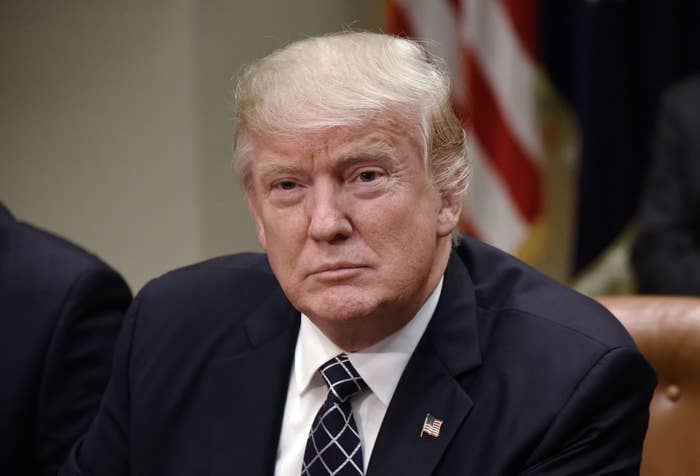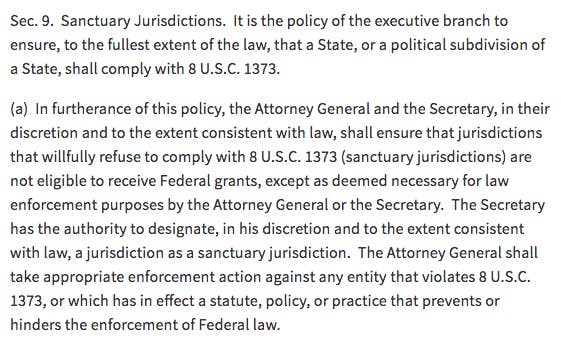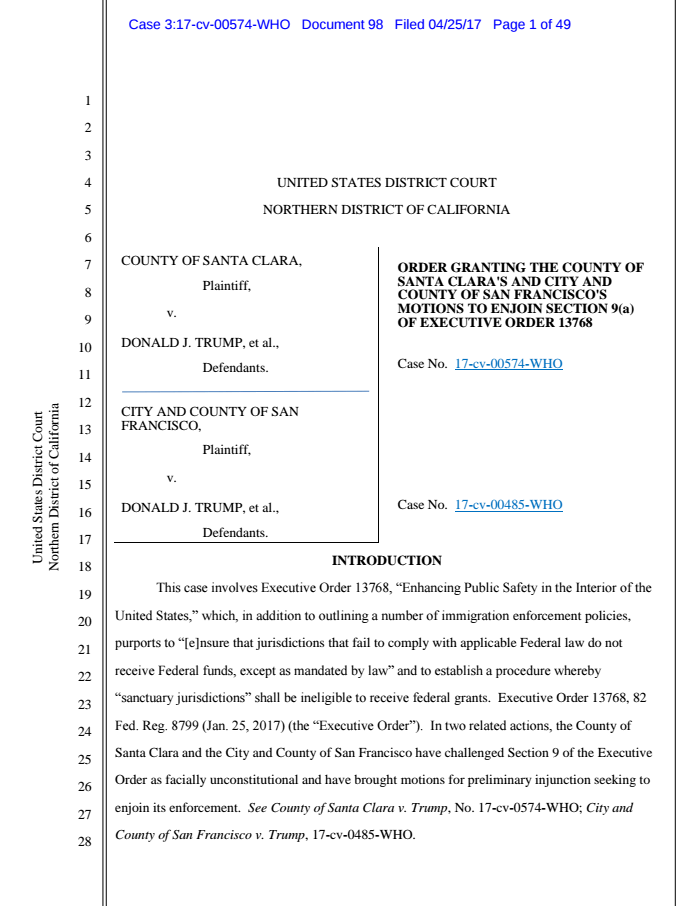
A federal judge on Tuesday barred the Trump administration from enforcing part of President Trump's January executive order that took aim at sanctuary cities — concluding that a challenged provision threatening federal funding for those cities is "clearly unconstitutional."
US District Judge William H. Orrick issued a nationwide preliminary injunction — sought by San Francisco and Santa Clara counties in California — against enforcement of Section 9(a) of the January 25, 2017, executive order.
The section of the order purported to give Attorney General Jeff Sessions and Homeland Security Secretary John Kelly broad authority to deny funds to cities that "refuse to comply" with a law that requires cooperation between state and local governments and federal immigration authorities.
"[T]he Order has caused budget uncertainty by threatening to deprive the Counties of hundreds of millions of dollars in federal grants that support core services in their jurisdictions," Orrick wrote.
"Today, the rule of law suffered another blow, as an unelected judge unilaterally rewrote immigration policy for our Nation," a late-night statement from the White House press secretary's office declared.
"Once again, a single district judge -- this time in San Francisco -- has ignored Federal immigration law to set a new immigration policy for the entire country," the statement continued. "This decision occurred in the same sanctuary city that released the 5-time deported illegal immigrant who gunned down innocent Kate Steinle in her father's arms. San Francisco, and cities like it, are putting the well-being of criminal aliens before the safety of our citizens, and those city officials who authored these policies have the blood of dead Americans on their hands."
Although the Justice Department argued a narrow interpretation of what the executive order authorized in court, Orrick pointed to the "plain language" of the order and the president's own words — Trump called the order "a weapon" to fight cities that opposed his immigration policies — in concluding that the narrow reading "is not legally plausible."
The Justice Department responded by defending its interpretation of the executive order and noting what the government continues to be able to do in the wake of the injunction. Justice spokesperson Ian Prior said in a statement:
The Court upheld the “Government’s ability to use lawful means to enforce existing conditions of federal grants or 8 U.S.C. 1373.” The Department of Justice previously stated to the Court, and reiterates now, that it will follow the law with respect to regulation of sanctuary jurisdictions. Accordingly, the Department will continue to enforce existing grant conditions and will continue to enforce 8 U.S.C. 1373. Further, the order does not purport to enjoin the Department’s independent legal authority to enforce the requirements of federal law applicable to communities that violate federal immigration law or federal grant conditions.
In reviewing the claims raised by the counties, Orrick found that the order likely violates separation of power principles, as well as the Fifth and Tenth Amendments.
He noted that the order does not provide any notice, review, or appeal mechanisms for cities or states affected by the order. "This complete lack of process violates the Fifth Amendment’s due process requirements," he wrote. Orrick also found that the order is likely void for vagueness under the Fifth Amendment because it gives "no clear guidance on how to comply with its provisions or what penalties will result from non-compliance."
Regarding the purpose for the executive order's funding threat, Orrick wrote, "The Executive Order attempts to use coercive methods to circumvent the Tenth Amendment’s direct prohibition against conscription."
Later, addressing the scope of the injunction, he wrote, "Given the nationwide scope of the Order, and its apparent constitutional flaws, a nationwide injunction is appropriate."
The enjoined section of the executive order:

Full statement from the White House Press Secretary's Office:
"Today, the rule of law suffered another blow, as an unelected judge unilaterally rewrote immigration policy for our Nation. Federal law explicitly states that “a Federal, State or Local government entity or official may not prohibit, or in any way restrict, any government entity or official from sending to, or receiving from, the Immigration and Naturalization Service information regarding the citizenship or immigration status, lawful or unlawful, of any individual.” 8 U.S.C. 1373(a). That means, according to Congress, a city that prohibits its officials from providing information to federal immigration authorities -- a sanctuary city -- is violating the law. Sanctuary cities, like San Francisco, block their jails from turning over criminal aliens to Federal authorities for deportation. These cities are engaged in the dangerous and unlawful nullification of Federal law in an attempt to erase our borders.
"Once again, a single district judge -- this time in San Francisco -- has ignored Federal immigration law to set a new immigration policy for the entire country. This decision occurred in the same sanctuary city that released the 5-time deported illegal immigrant who gunned down innocent Kate Steinle in her father's arms. San Francisco, and cities like it, are putting the well-being of criminal aliens before the safety of our citizens, and those city officials who authored these policies have the blood of dead Americans on their hands. This San Francisco judge's erroneous ruling is a gift to the criminal gang and cartel element in our country, empowering the worst kind of human trafficking and sex trafficking, and putting thousands of innocent lives at risk.
"This case is yet one more example of egregious overreach by a single, unelected district judge. Today’s ruling undermines faith in our legal system and raises serious questions about circuit shopping. But we are confident we will ultimately prevail in the Supreme Court, just as we will prevail in our lawful efforts to impose immigration restrictions necessary to keep terrorists out of the United States.
"In the meantime, we will pursue all legal remedies to the sanctuary city threat that imperils our citizens, and continue our efforts to ramp up enforcement to remove the criminal and gang element from our country. Ultimately, this is a fight between sovereignty and open borders, between the rule of law and lawlessness, and between hardworking Americans and those who would undermine their safety and freedom."


